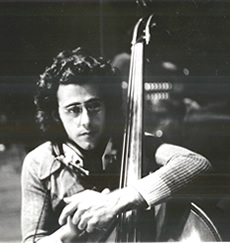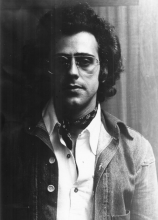Father Time Review Written by: Michael Kydonieus
The career of the great bassist Frank Tusa is one of the great mysteries of jazz, as he was only involved in a handful of recordings throughout the 70s. Fortunately, Enja reissued this stunner in 2006. Father Time is Tusa’s only recording as a leader, unless you include Sunday Song, his duet album with Richie Beirach. It makes you wish he had recorded under his own name more often. The band he’s using is basically Lookout Farm, Dave Liebman’s band, which Tusa was a member of at the time, but the orientation is completely different. For one thing, Father Time is completely an acoustic album. Rather than being fusion, like the recordings of Lookout Farm, Father Time is mostly free jazz with a little world music, postbop, and funk thrown in. Amazingly, given the variety on the date, all the tunes were written by Tusa.
In the opener, Doin’ It, it seems as though Tusa dictated a rhythm, an order in which the instrumentalists were supposed to enter the conversation, and that everything else was free. No set chords or melody at all. The result is a funky, bluesy vamp with one of the fiercest tenor sax solos David Liebman has ever committed to wax. Richie Beirach (piano), who has seemingly telepathic communication with Liebman, comps intermittently, feeding Liebman chords that weave around the pedal point, which inspire Liebman in all sorts of different harmonic directions. It’s an intense, rich performance, but only one of the many highlights of the album. Cameo is the only through composed piece, a gorgeous ballad. The introduction is played by Beirach and Tusa. Their playing is full of emotion, but rigorously unsentimental. Then Liebman joins in on alto flute. The combination of these three stellar musicians, each listening and contributing to this powerful piece is pure magic.
The next piece, Gipsy Song, is Tusa’s de facto solo feature, in that all of the other musicians are playing percussion. It’s clear that Tusa has again dictated the tempo and groove, and maybe told the rest of the musicians about his basic intent to use Eastern European motifs. The rest is pure improvisation. This track casts a spell that makes you feel like you are in a different century and culture (unless you happen to be a gypsy). Mabel’s Mood finds Tusa once again developing a tune out of whole cloth with Richie Beirach. The depth of their imaginations and their lightning quick response to each others ideas is otherworldly. There’s no other word for it. I don’t know. Beirach’s playing is so tuneful and melodious, maybe Tusa gave Beirach some suggestion as to possible themes to explore. The next tune, Kristie’s Spirit, is again a free improvisation featuring Dave Liebman on alto flute and the final tune is String Beans, which is yet another free improvisation featuring Liebman on tenor, Tusa, and Jeff Williams on drums. It sounds like Tusa gave Liebman a single melodic fragment as the basis of the tune, or maybe just a scale.
As any decent jazz musician can tell you, playing free requires tremendous discipline because you have no structure to fall back on. You have to create a collaborative structured performance in real time that’s constantly changing. That’s a huge challenge and one that Frank Tusa’s band meets here with complete success. I consider this one of the greatest free jazz recordings of all time. Considering that this recording was obscure when it was released and probably sold zip, we are extremely fortunate that Enja has reissued this unsung classic on CD. Snap it up quickly before it goes away.


